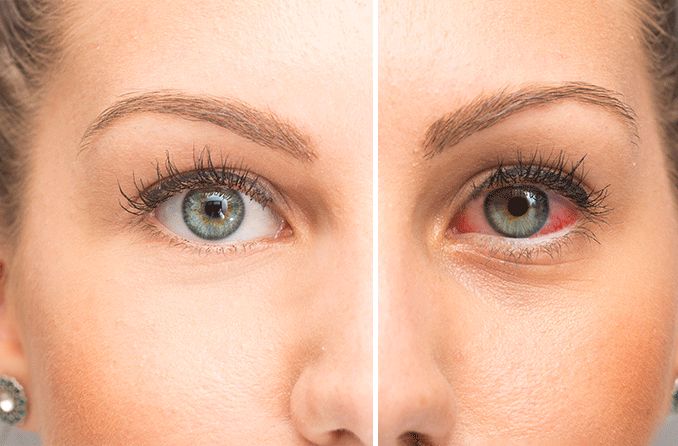
Dry eye disease occurs when you lack tear quantity or quality. Dealing with the discomfort of dry eyes can be a daily battle, and the condition can affect your vision.
The condition includes various symptoms, such as:
- Dry eyes
- Redness
- Watery eyes
- Blurred vision
- Light sensitivity
- Irritated or scratchy eyes
There are multiple potential causes of dry eyes, from allergies to medical conditions to computer use. Knowing the cause can be helpful, particularly if it’s a treatable condition or a removable environmental factor.
However, if you’re not a master detective, sometimes focusing on managing symptoms can be the difference between another lousy day or a day without dry eyes. So here are 10 home remedies for dry eye relief.
1. EYE DROPS
If you’re not producing enough tears, you can try artificial tears. Over-the-counter lubricating eye drops can support your tear film to protect the surface of your eye.
Many eye drops contain preservatives that stop harmful bacteria from forming after opening the product. Unfortunately, although rare, some eyes can react to the preservatives, resulting in inflammation and dry eyes. If your eye drops seem to cause dry eye or increase symptoms, talk to your optometrist about eye drops without preservatives.
2. LIMIT SCREEN TIME
One of the most common symptoms of digital eye strain is dry eyes. The average person blinks 12 times every minute, but we only blink 5 times per minute when using a computer. As a result, our wide-open eyes are more prone to dryness, experiencing eye strain, developing headaches, and feeling irritated.
Taking frequent screen breaks gives our eyes time to relax after focusing on digital screens. It’s best to follow the 20-20-20 rule, allowing your eyes space and time away from screens.
3. WARM COMPRESS
Using a warm compress can help treat symptoms of many eye conditions. For example, heat can soothe irritation or inflammation caused by dry eyes. Additionally, it may also stimulate the meibomian gland to produce more tears.
It’s also a chance to close your eyes and allow them some rest.
4. MASSAGE
There are many benefits to a gentle eye massage. A little pampering and attention can help alleviate tension, improve blood flow, and relax muscles. Although you’re not directly touching your eye, touching the areas surrounding your eye can impact eye sensation and potentially encourage tear production.
However you choose to massage your eye area, it should never be painful. If you don’t have expertise in massage or acupuncture techniques, it’s best to consult a professional first.
5. CLEAN EYES
Keeping your eyelids, eyelashes, and ocular area clean is essential in protecting your eye health. It can prevent the buildup of bacteria which can cause eye conditions or eye diseases to develop, such as blepharitis.
Blepharitis is an inflammation of your eyelids caused by clogged oil glands located behind your eyelashes. Although blepharitis is preventable, the condition is irreversible. It can cause eye irritation, redness, dryness, or burning.
Cleaning your eyes is essential in keeping your oil glands unclogged and producing adequate tears. If you suspect you have blepharitis, you should visit your optometrist to discuss treatment options.
6. BETTER SLEEP
Sleep is crucial for resting your mind and body. It’s the only time when your eyes stay closed for an extended time, giving them protection and rest. Healthy sleep benefits multiple functions of our body, including:
- Stress
- Repair
- Memory
- Heart health
- Metabolism
- Energy levels
- Cognitive skills
- Immune system (inflammation)
Sleep is crucial if your dry eyes result from an immune disorder, as sleep regulates inflammation.
How much sleep you need will change with age and wellness. For example, you might need more rest to fight a cold. Generally, adults range between 7–9 hours. Seniors need less sleep as they age. On the other end, children and teens need more rest.
7. DRINK WATER
Although water isn’t the only ingredient in tears, it is the most significant. Water comprises 98% of a tear, with 2% oils, salt, and over 1,500 proteins. So if you’re not drinking enough water, you’re drying out your tear production.
You might have heard adults should drink 6–8 250 mL (8 fl oz) glasses of water per day. It’s a helpful guideline, but it isn’t a perfect recommendation for everyone. How much water you need depends on your activity level, health, and environment.
If you’re not sure how much water is best for you, start with the guideline of 6–8 glasses. Then, talk to your doctor about hydration and your health.

8. HUMIDIFIER
If the room is dry, it might be affecting your eyes. A humidifier adds moisture into the air and can ease symptoms caused by dryness.
Humidifiers can also improve other health issues related to dryness.
- Dry skin
- Dry cough
- Nose irritation
- Dry throat
- Headache
- Sinus congestion
If you experience other symptoms of dryness, a humidifier can be a handy option when used correctly.
9. OMEGA-3 FATTY ACID
You can reduce your risk of dry eye by 17% if you add fish oil to your diet. In addition, omega-3, commonly found in fish oil, can benefit your eye health by soothing symptoms and improving your tear quality.
Although eating fish is an option for a natural dose of omega-3 fatty acids, you can also take supplements.
10. EYEWEAR
Using eyewear, from sunglasses to sports goggles, is an excellent practice for eye safety. It can also keep irritants or particles from aggravating your dry eyes.
Sunglasses protect your eyes from UV damage. Sunglasses also reduce brightness. If your eyes are sensitive to light (photophobia), you can experience dry eyes.
Eyewear provides a shield between your eyes and irritating environmental factors, like dust, wind, and chemical irritants (perfumes, cleaning products, etc.).
FIND MORE DRY EYE RELIEF WITH YOUR OPTOMETRIST
Knowing some home remedies can be helpful when symptoms of dry eye flare up. But if your symptoms are increasing or you’re ready for alternative treatment, your optometrist can help you find more options.
Dry eyes can be uncomfortable, but they can also indicate developing eye conditions. Schedule an eye exam with the Eye Center at Jackson to learn about your eye health and how we can help with dry eye relief.
Credits to the original link: https://advanceeyecarecenter.com/10-home-remedies-for-dry-eye-relief/
